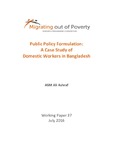| dc.contributor.author | Ashraf, ASM Ali | |
| dc.coverage.spatial | Bangladesh | |
| dc.date.accessioned | 2019-12-12T15:50:39Z | |
| dc.date.available | 2019-12-12T15:50:39Z | |
| dc.date.issued | 2016-07-01 | |
| dc.identifier.uri | https://opendocs.ids.ac.uk/opendocs/handle/20.500.12413/14851 | |
| dc.description.abstract | On 21 December 2015, the Bangladesh government approved the Domestic Workers’ Protection and Welfare Policy (DWPWP) 2015, the adoption of which offers an interesting case study through which to understand how public policy is formulated in Bangladesh. This paper employs a process-tracing methodology to explore the evolution of the DWPWP 2015. Drawing on elite interviews and documentary research, it identifies the stakeholders who were involved in formulating the policy and the role they played in support of or in opposition to it. It then employs the 3–i framework to explain which institutions, ideas and interests influenced the stakeholders. Findings from this research generate useful policy lessons pertaining to the strength of national trade unions and NGOs, the dominant role of the Ministry of Labour and Employment (henceforth MLE), incremental policy progress and concerns over international migrant workers. | |
| dc.description.sponsorship | DFID | |
| dc.language.iso | en | |
| dc.publisher | Migrating out of Poverty | |
| dc.title | Public Policy Formulation: A Case Study of Domestic Workers in Bangladesh | |
| dc.type | Other | |
| dc.rights.holder | University of Sussex | |
| dc.identifier.externaluri | http://www.migratingoutofpoverty.org/files/file.php?name=wp37-ashraf-2016-public-policy-formulation-a-case-study-of-domestic-workers-in-bangladesh.pdf&site=354 | |

